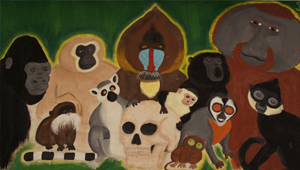What is Anthropology?
Mr. Samir Al Baghdadi
Broadly speaking, anthropology is the study of people. It can be focused on people from the past or the present, depending on the exact branch of anthropology that is being discussed. It is a comparative discipline, which means that anthropology makes assumptions about basic human attributes over the course of places and time. However, it also acknowledges that each society has its own history, which shares commonalities with others while also experiencing variations. A few of the most common branches of anthropology are listed and explained further below.
Archaeology
Archaeology is probably the most popular, and the most well known branch of anthropology. Made popular by movies such as the “Raiders of the Lost Ark,” and its subsequent sequels, and seen in many other television shows, documentaries and the like, archaeological discoveries often generate a great deal of interest in the news media. The scientists who work in this field of anthropology study the culture and people of a particular society by using the artifacts they find. Such artifacts can be pottery, animal bones, structural remains and stone tools, to name just a few. These findings give scientists clues about how people lived, their social structure, ideologies and more.
Linguistic Anthropology
This branch of anthropology studies the ways in which language is used by a society. The use of language reflects the social lives of different societies. Its use also reflects the influence that language exerts on the society in which it is used within that social framework. Language, for example, is used as a way to categorize group membership and social standing. It is also used as a mechanism for organizing cultural ideologies and beliefs. By studying the language of a people or culture, scientists can better understand its social change, power and inequality.
Sociocultural Anthropology
Specializing in the study of a culture’s social practices and patterns, scientists in the discipline of sociocultural anthropology are particularly interested in how people create meaning in the places in which they live, as well as how they govern and organize themselves. A crucial difference that sets this branch of anthropology apart from others in the field is its focus on both differences and similarities. Studying the inner workings of societies as well as how they compare to other societies, these scientists pay particular attention to class, race, gender, nationality and sexuality as they gather information. Another striking way how sociocultural anthropology is set apart from other types of anthropology is the fact that findings are often gathered by direct observation by the scientists. The scientists placing themselves within the society itself and then noting how that society’s participants navigate the various issues that occur within the context of everyday life accomplish this. Philosophical issues, such as power, truth, justice and knowledge, and the ways that the society deals with them are also noted.
Biological Anthropology
Also referred to as physical anthropology, this branch seeks to understand how people react to their physical surroundings. The adaptions to their changing surroundings that humans display is the backbone of this scientific study. Scientists want to understand how cultural and biological factors work together to shape various elements of a society such as its behavior, growth and development. In addition, biological anthropology also seeks to understand the causes of early death and disease that are seen in a particular society. The origins of a society as well as its variations and evolution are a crucial part of this branch of anthropology. It is from this study that questions dealing with evolutionary theory spring. This leads to a grasp of the age-old questions of humans and how they fit into the global universe, as well as how their adaptions and variations lead to changes. To facilitate the study of humans, biological anthropologists also study other living beings, including primates, fossils and prehistory. Some scientists chose to specialize further in one of those sub branches of biological anthropology.
Search
News

رئيس جامعة الناصر الاستاذ الدكتور عبدالله حسين طاهش يقوم بزيارة تفقدية للجان والقاعات الامتحانية الخاصة بكلية الهندسة وعلوم الحاسوب الاثنين 24 فبراير 2025
قام رئيس الجامعة الاستاذ الدكتور عبدالله حسين ط...
جامعة الناصر تنظم ورشة حول التهيئة الرمضانية لمنتسبيها
نظمت جامعة الناصر صباح اليوم الأثنين 25 شعبان 1...
اختتام المؤتمر العلمي الأول للجامعات اليمنية في صنعاء
اختتم اليوم في العاصمة صنعاء، أعمال المؤتمر الع...
لليوم الثاني على التوالي، استمرار أعمال ونقاشات المؤتمر العلمي الأول للجامعات اليمنية.
تستمر في العاصمة صنعاء لليوم الثاني على التوالي...
بمشاركة جامعة الناصر وبحضور رسمي رفيع انطلاق المؤتمر العلمي الأول في صنعاء
صنعاء 20 شعبان 1446 هجرية الموافق 18 فبراير 202...

